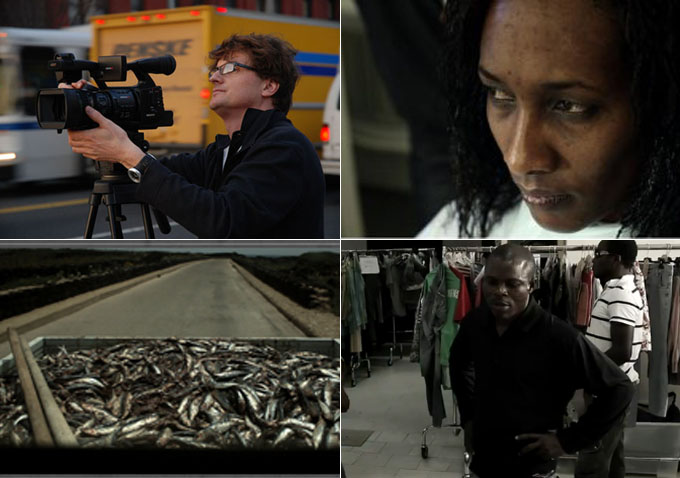 There's a small Italian island in between Sicily and Africa that, for years, has served as a stepping stone for African immigrants looking for a brighter future. Recently, a large film production took to this haven in order to tell a fictional account of these people — though, as it turns out, the migrants play second fiddle to a white character who leads the narrative. Camera in tow, Antonio Tibaldi documents the behind-the-scenes riff raffs, shooting both the African extras and the local townspeople as they display their respective frustrations with the grandiose movie attempting to tell their story. "[s]comparse" has plenty of intelligent, great ideas — for example, the movie shoot is treated like an unwanted foreigner by the natives, opening up plenty of interesting layers — but is brought down by its conventional, repetitive structure.
There's a small Italian island in between Sicily and Africa that, for years, has served as a stepping stone for African immigrants looking for a brighter future. Recently, a large film production took to this haven in order to tell a fictional account of these people — though, as it turns out, the migrants play second fiddle to a white character who leads the narrative. Camera in tow, Antonio Tibaldi documents the behind-the-scenes riff raffs, shooting both the African extras and the local townspeople as they display their respective frustrations with the grandiose movie attempting to tell their story. "[s]comparse" has plenty of intelligent, great ideas — for example, the movie shoot is treated like an unwanted foreigner by the natives, opening up plenty of interesting layers — but is brought down by its conventional, repetitive structure.
Before "Big Hollywood” settles in, Tibaldi takes us through the quiet town to establish the laid-back lifestyle of its inhabitants. The peaceful atmosphere is then interrupted by the arrival of the film crew, who prance around town discussing stunt work and location particulars. These two different worlds co-exist well enough at first, but the filmmakers' imposing attitude soon irritates the community, as first shown in a scene where a producer begs an elderly woman to let them shoot in her kitchen. Meanwhile, African extras are recruited from Sicily to play immigrants but find the long hours and low pay insulting. As they attempt to devise a plan to make more cash, some of the participants are aghast with the narrative — if they want to tell the true story of immigration, why not follow a person from the African continent and show the actual journey? The fishermen express disappointment as well, not only for the disruption of their business (the shoot interferes with the sealife in various ways), but also for the lack of consultation by the producers — according to them, a protest scene in which hundreds of fish line the sidewalk is unrealistically staged, yet their constructive criticism falls on deaf ears.
Many more vignettes featuring the locals or African extras follow, and while their vocal resentment of the film crew raises pretty substantial topics, they’re drained of power by the dull way in which they’re presented. Tibaldi sticks to documentary conventions much to his own detriment: sit-down interviews are plentiful, and when that wears thin, he cuts to random footage with the rest of the interview track overlaid. It’s all a little too standardized and could desperately use some genuine emotion or life. The fact that most moments come and go quickly without any time to marinate makes things even more wearying. Still, it’s not the most difficult watch: at only 62 minutes it’s far from a tortuous endurance test.
What’s curious is the mystery film that Tibaldi is taking aim at — its title isn’t mentioned, the director isn’t named — but it’s a pretty damning portrait of a movie that hasn’t yet been released. Though the participants’ criticisms of the film crew and movie are solid, the general lack of insight from the filmmakers’ end is questionable, and upon reflection, the end result seems unfairly one-sided.
At the end of the day, a more adventurous approach would’ve served the subject better, but “[s]comparse” still contains plenty of stimulating ideas to keep it from being a total bust. [C]

